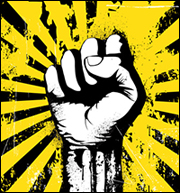 |
 |
Dr Nick Coates
Nick oversees Promise's research activities and has a particular interest in the creative industries, education and the arts, language and semiotics and cross-cultural research. Nick led Promise's work with LSE Enterprise to produce a report on the history, application and benefits of co-creation.
Read the full biography here. |
Co-creation: evolution or revolution?
....eh tell us what you think
23rd June, 2011
Co-creationís an idea that has finally arrived in the mainstream. Surveys
from the likes of IBM have highlighted co-creation as a key objective for
businesses. Co-creation is appearing in conference titles as well as in
individual sessions. Co-creation features in at least one job title I know
of. Forrester has got behind it. Even Michael Porter has shifted his
thinking this year to a concept of Ďshared valueí. And in market research,
after 3 consecutive years of promotion at various conferences as well as in the
MR press, co-creation looks as though itís become a standard MR offering: currently there are at least 70 MR agencies offering co-creation services - pretty startling progress from a few years back!

But like the underground indie fan who starts worrying that his favourite
band has sold out once more than 3 people are willing to schlepp to hear
them on a rainy Tuesday night in Camden, I find myself wondering what the
new fans are up to. Are they into the same tunes as me? Which part of the
sound excites them most? Donít they know about the early days? One thing I
can be sure of: there will be plenty of variation. This isnít a well-defined
process or procedure, not yet. To my mind co-creationís an idea, not a tool.
But is this how our Ďindustryí sees it?
Thereís a fairly strong minority who still think co-creationís a mirage;
like the emperorís new clothes, when you look closely thereís nothing there.
This group tends to ask, slightly incredulously, ďIsnít it just a big focus
group?Ē And thereís also a natural resistance to some of the different
working practices that co-creation brings...are we blurring boundaries?
But there is also a broadly positive mood emerging that takes one of 3
different perspectives as its starting point:
| |  |
itís a valid new technique that needs integrating into the toolkit, but
itís just that...an isolated technique which has a specific function at a
specific time...a sort of research monkey wrench.
| | |  |
Itís just another version of what good qualitative research has been
doing for a while Ė some of these co-creation converts are a little naive,
so letís not forget the craft skills along the way.
| | |  |
Itís a disruptive technology, a fundamental challenge to MRís positivist
/ social science basis and in many respects runs counter to market research
practice, we can either embrace that or resist it.
| | |
In other words, there are weak and strong claims that can be made for
co-creation. And of course, depending on your perspective, all of them have
merits.
Of course researchers love a new technique. And with falling response rates
for traditional panel work, a co-creative approach seems a logical place to
look for novelty, alongside the hyper-scientific (brain science, facial
analysis etc). But I think we have to raise an eyebrow here and there,
particularly in the online space, where increasingly basic panel approaches
are being given a bit of spit and polish, a couple of creative gizmos thrown
in and re-branded communities. I think itís dangerous to reduce co-creation
to a technique unless you have the wider context and field of enquiry in
mind. Itís a bit like semiotics in that respect. So I think we need to look
beyond an object-oriented view of co-creation as NPD, another tool for
getting input on new products and services, however important to the
co-creation mix this will be.
So the question really becomes: is co-creation an evolution or a revolution?
I have a lot of sympathy for the evolution argument. In my investigations
into the pre-history of co-creation itís notable how much comes from
research-related fields like psychotherapy (Freud, but also Jung,
Winnicott...) and organisational psychology (particularly Kurt Lewin, the
creator of action research), but also from literary theory and the whole
linguistics-based side of things: after all meaning is always co-created.
Equally there are inputs from the world of service design, particularly
around participatory design, which has often run in parallel with market
research practice. But I wonder how much of this gets aired, or needs to get
aired, when co-creationís on the agenda?

Look at the wider business world and itís clear the game has changed.
Companies are being built on co-creative foundations (think NIKE ID, Lego,
and Apple). Technology for communication, collaboration, pro-am creativity is
ubiquitous and easy to use. People have more time to invest and more
opportunities for getting involved as Clay Shirky has been arguing (see his
Cognitive Surplus). Co-creationís potential is of a different order now. And
the areas of interest to businesses are more in line with open innovation,
mass customisation, creating a dialogue with customers. I donít want to
sound like some kind of prophet Ė much of the potential will turn out to be
groundless, much will be reduced once the novelty has worn off. But some
significant part will stick. Our challenge will be to find the sticky bits.
Market research is typically still seen as a Ďtraditionalí and safe, but
useful activity, by the outside world. And it will take a while to shift
this view when so much is still fundamentally measurement, evaluation,
opinion polling, and tracking. To my mind the risk for research actually is
being left out. Can we be more a part of creation, of productive work, and
less about understanding the past? Market research shouldnít be worried
about competition. Itís substitution it needs to worry about. Becoming
irrelevant. Becoming a smaller and smaller part of the pragmatic management
toolkit. And letting management consultants, technologists, and marketing /
innovation agencies rule the co-creation roost is one way of continuing to
be irrelevant. If you go to the Co-Creation Association conference, for
example, you wonít find many market researchers there. The term resonates in
quite a different way.
Co-creation can be seen on a spectrum: at one end we have co-creation as
new MR tool; at the other we have co-creation as a value-creation ethos. As
new MR tool co-creation stands for a more creative group approach, online
communities perhaps, and some versions of customer closeness, but in any
case itís a subset of market research rather than a new activity or approach
in its own right. As a value-creation ethos co-creation straddles Ďplatformí
approaches like NIKE ID and iPhone, which allow users to add value to the
experience as well as socialising it, but also the whole-organisational
approach that a dialogue implies. Moving towards this end of the spectrum
implies a much greater focus on organisational factors and making things
happen. So I think we have choices to make about where we invest our time
and energy, and we need to recognise that the palette is broadening to
include:
| |  |
Co-creation as management ethos
| | |
 | Co-creation as open innovation practice
|
| |
 | Co-creation as approach to meaning-making
|
| |
 | Co-creation as organisational change
|
| |
 | Co-creation as business model
|
| |
 |
Co-creation as workshop / group facilitation technique
| | |
But thereís also considerable cause for optimism. Researchers have a vital
contribution to make, precisely because thereís much of the outside world
thatís trying to appropriate co-creation as the label for things like mass
customisation and some pretty basic, quantity not quality-based,
crowd-sourcing. Thereís a wealth of craft needed for successful
co-creation Ė itís not a miraculous thing that just occurs by itself. And
the qualitative tradition in particular has a lot to offer to co-creation
practitioners whichever domain they see themselves in.

Dr Nick Coates
Comments on this article

Want to share your thoughts...?
NOTE: Please note that this board is moderated, and comments are published at the discretion of the site owner.
|